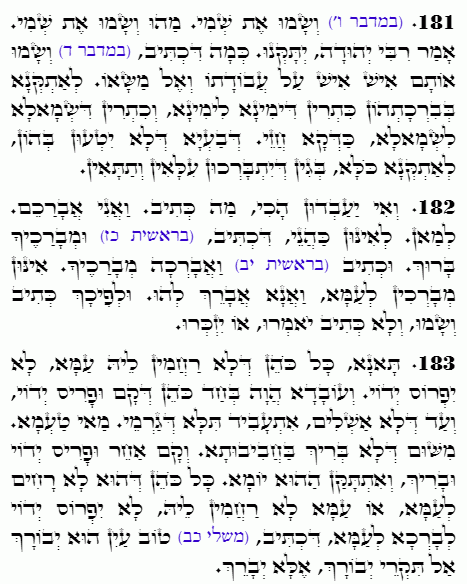Daily Zohar # 4583 – Naso – Think love before raising your hands
Daily Zohar 4583

Hebrew translation:
182. וְאִם יַעֲשׂוּ כָּךְ, מַה כָּתוּב? וַאֲנִי אֲבָרֲכֵם. לְמִי? לְאוֹתָם כֹּהֲנִים, שֶׁכָּתוּב (בראשית כז) וּמְבָרֲכֶיךָ בָּרוּךְ. וְכָתוּב (שם יב) וַאֲבָרְכָה מְבָרֲכֶיךָ. הֵם מְבָרְכִים אֶת הָעָם, וַאֲנִי אֲבָרֵךְ אוֹתָם, וּלְפִיכָךְ כָּתוּב וְשָׂמוּ, וְלֹא כָתוּב יֹאמְרוּ אוֹ יִזְכְּרוּ.
183. לָמַדְנוּ, כָּל כֹּהֵן שֶׁלֹּא אוֹהֲבִים אוֹתוֹ הָעָם, לֹא יִפְרֹשׂ יָדָיו. וּמַעֲשֶׂה הָיָה בְּכֹהֵן אֶחָד שֶׁקָּם וּפָרַשׂ יָדָיו, וְעַד שֶׁלֹּא הִשְׁלִים נַעֲשָׂה גַּל עֲצָמוֹת. מָה הַטַּעַם? מִשּׁוּם שֶׁלֹּא בֵרַךְ בַּחֲבִיבוּת. וְקָם אָחֵר וּפָרַשׂ יָדָיו וּבֵרַךְ, וְהִתְתַּקֵּן אוֹתוֹ הַיּוֹם. כָּל כֹּהֵן שֶׁאֵינוֹ אוֹהֵב אֶת הָעָם אוֹ הָעָם לֹא אוֹהֲבִים אוֹתוֹ, לֹא יִפְרֹשׂ יָדָיו לְבָרֵךְ אֶת הָעָם, שֶׁכָּתוּב (משלי כב) טוֹב עַיִן הוּא יְבֹרָךְ, אַל תִּקְרֵי יְבֹרָךְ, אֶלָּא יְבָרֵךְ.
.
Zohar Naso
Continued from previous DZ
#181
Numbers 6:27
“וְשָׂמוּ אֶת שְׁמִי עַל בְּנֵי יִשְׂרָאֵל וַאֲנִי אֲבָרֲכֵם”
“So they shall put My name on the children of Israel, and I will bless them.”
He asks, what is meant by “And they shall put My name”? Rabbi Yehuda explains that it means “to establish.” As it is written, “וְשָׂמוּ אוֹתָם אִישׁ אִישׁ עַל עֲבֹדָתוֹ וְאֶל מַשָּׂאוֹ” “And they establish them, each man according to his service and according to his burden” (Numbers 4:19). That is, those who benefit from the blessings should arrange the Sefirot correctly: the Sefirot of the Right to the Right, and the Sefirot of the left to the left, as appropriate. It is necessary not to make mistakes in them and to arrange everything properly so that the upper and lower realms are blessed.
Explanation: The three verses of the priestly blessing correspond to the three lines: Right, Left, and Middle. The priest must meditate and turn to the Right when reciting the first blessing. Turn to the left for the second blessing and the middle line for the third blessing.
The priest must have the correct meditation for each part of the blessing, ensuring the proper Light is aligned and activated. This ensures that the blessing flows harmoniously through the sefirot’s structure and into the world, bringing blessings to the upper and lower levels.
#182
And if they do so, it is written? ‘And I will bless them.’ To whom? To these priests. As it is written,’וּמְבָרֲכֶיךָ בָּרוּךְ’ ‘And those who bless you, I will bless’ (Genesis 27:29). And it is written, ’וַאֲבָרְכָה, מְבָרְכֶיךָ’ ‘And I will bless those who bless you’ (Genesis 12:3). These priests bless the people, and I will bless those who bless. Therefore, it is written, ‘ושמו’ (‘and they shall put My name’), and not ‘יאמרו’ (‘they shall say’) or ‘יזכרו’ (‘they shall mention’).”
#183
We have learned that any priest the people do not love should not raise his hands to bless. There was an incident involving a priest who stood and raised his hands, and before he completed the blessing, he turned into a pile of bones. What was the reason? Because he did not bless with love. Another priest stood, raised his hands, and blessed, rectifying the day. Any priest who does not love the people or whom the people do not love should not raise his hands to bless the people, as it is written (Proverbs 22:9): “He who has a generous eye will be blessed.” Do not read “יבורך” (will be blessed), but “יברך” (will bless).
Lesson;
The purity of the priest and the expression of love are important in channeling Hashem’s blessings from the higher levels to the world. If the ‘channel’ is flawed, the supernal Light breaks the vessel of the priest.
The priests create the channel when they act, “They shall put My name on the children of Israel,” raising their hands and splitting their fingers into four groups to connect to the Ten Sefirot and the YHVH. Then, “I will bless them.” The blessings come from YHVH.
During the recitation of the priestly blessing in the synagogue, the leader of the prayer, who represents the congregation, recites each word of the blessing before the priest repeats it. The people’s desire to receive the blessing comes first before the priest repeats the words and channels the Light of YHVH to them.
{||}

 Previous: Naso
Previous: Naso

